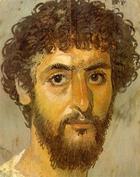
"Synesius and Synesius of Cyrene (Greek:. Συνέσιος; Cyrene, c 370 - Ptolemais, 413 or 14) was a Neoplatonist philosopher and Greek, natural clergyman of the Pentapolis of Cyrenaica in Libya today Rico aristocrat, was a disciple of. philosopher of Alexandria Hypatia and friend of the patriarch of Alexandria Theophilus. in 409 or 410 he was elected bishop of Ptolemais, a post he accepted reluctantly. Sinesio belonged to one of the most important families of Cyrene, a descendant of one of the companions of Heracles was said . Educated initially in eloquence, drank from the classical tradition through Aristotle, Homer and Plato, feeling heir of Dio Chrysostom. initiated also in the sciences, being home to Theodore and Cyrene Eratosthenes was passionate about hunting, weapons and equestrian exercises, own entertainment late Roman aristocracy.
Before 395 Sinesio lived for three or four years in Alexandria. There he met Hypatia, Platonic philosopher and daughter of the mathematician Theon, becoming his pupil and disciple. He trained in astronomy, mathematics and Neoplatonism, covering the wide range that separates the ends of applied science and metaphysics.
After completing his studies, Sinesio traveled to Athens, but both the city as their own active Neoplatonic school will deeply disappoint. Back on Cyrene in 399 their fellow citizens entrusted him to lead an embassy to ask the emperor to reduce taxes imposed on the Pentapolis. To fulfill its mission, Sinesio moved to Constantinople, where he remained for three years. In the speech About royalty, delivered before the emperor Arcadius, criticized the abuse of power and corruption, as well as the fact that the defense of the borders entrust Germans, who Sinesio considered barbarians.
In 402 he returned with success: it had achieved a significant reduction in taxes. He moved to Alexandria, where he married a Christian, belonging to the nobility of the city. The Patriarch Theophilus married the couple personally.
Back on Cyrene, he was personally involved in the defense of the frontiers, building a new model catapult and strengthening the fortifications. At the end of 409, or 410, in gratitude for services rendered, the clergy and the people of Ptolemais elected him as their bishop. Sinesio refused to accept the position, but ended up assuming it at 411, but not before exposing to the Patriarch Theophilus conditions: not give up their marriage or their philosophical convictions, which prevented him from accepting some common beliefs. According to Quasten until the end of his days remained Synesius 'more Platonic than Christian, as revealed in his writings' .6 However, since his appointment as bishop again referring to his wife in his letters, so some researchers suspect that the Patriarch was forced to renounce his conjugal life.
Whether bishop, Synesius used his authority to defend his compatriots attacks the desert tribes and abuse of Andronicus, a senior government official who had spent years committing serious abuses against the population. Sinesio gave him the first solemn excommunication of which the news.
Although prudence and judgment he showed as a bishop, Synesius recent years were very bitter. His brother was forced to flee to avoid being named decurion posed by the economic ruin of the person concerned must respond as guarantor of public revenue. In the year 413, after losing their three children, he wrote to his teacher Hypatia had suffered "many misfortunes as a man capable of suffering," and scolded that she and her friends from Alexandria had responded to his letters. That same year, he died, consumed by the memory of her dead children. "





